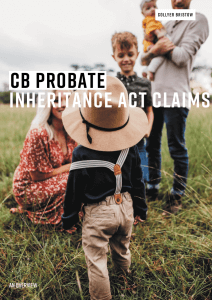
The Team
Our lawyers have the expertise and experience to provide you with creative, personalised solutions in a clear and understandable way.
Our Publications
Discover a wealth of invaluable guidance in the form of guides and brochures written by our expert lawyers.
Our insights
Discover the latest insights and thought leadership from our team of legal experts.
About
Who can claim under the Inheritance Act 1975?
Anyone who falls into one of the following categories potentially can claim for ‘reasonable financial provision’ if they consider that the deceased’s estate does not provide adequately for them:
- Spouse or civil partner of the deceased
- A former spouse or civil partner who has not remarried
- An unmarried partner who lived with the deceased for at least two years before the death
- Child or someone who was treated as a child by the deceased
- Financial dependent of the deceased
What is reasonable financial provision?
What amounts to ‘reasonable financial provision’ will vary according to the specific circumstances of the claim. The court is required to consider a range of factors such as:
- The financial needs and resources of the claimant and other beneficiaries / applicants
- Any physical or mental disability of the claimant and other beneficiaries/applicants
- Any obligations the deceased had towards the claimant or other beneficiaries/applicants
- The size of the estate
- Any other matter, including the conduct of the parties, the court considers relevant
As you can see, the tests applied by the court are deliberately vague. For anyone other than a spouse, reasonable financial provision means what is reasonable for “maintenance” – in other words, not so little the claimant lives in poverty and not so much they live in luxury at the expense of the other beneficiaries of the estate. What is reasonable boils down to a value judgement by the courts, which can make it difficult to predict the outcome of a case.
One example is the 2017 case of Illot v Mitson. Here, the Supreme Court overturned a decision of the Court of Appeal to award the deceased’s adult daughter £163,000 from an estate worth roughly £500,000, despite repeated verbal and written instructions from the deceased that her estranged daughter should not receive anything. The Supreme Court reinstated an earlier award of just £50,000.
The Supreme Court emphasised the importance of limiting awards to “maintenance,” meaning everyday expenses of living and not everything the claimant desires to have.
How long do Inheritance Act claims take?
It can take months or even years to resolve an Inheritance Act claim depending on the circumstances. Claims are generally resolved much faster if the parties can reach an amicable solution between themselves instead of going to court.
If you wish to bring an Inheritance Act claim, we recommend that you get your financial evidence and statement of needs in order at the outset. This will demonstrate your commitment to the claim and should encourage early settlement discussions.
For existing beneficiaries who wish to defend the estate against an Inheritance Act claim, a well-pitched offer may be the best way to protect the estate from the costs and risks of litigation. It will also be the quickest way to realise your inheritance. Our solicitors can help you in either scenario and will advise you of the best path forward.
How Collyer Bristow can help with Inheritance Act claims
If you think you may have a claim under the 1975 Act, you must act quickly. You only have six months from the date of the Grant of Probate to issue a claim, unless the court grants permission for a late claim.
We advise on Inheritance Act claims regularly and have secured lucrative settlements for spouses and children who were wholly or partially excluded from the deceased’s estate. Our team is here to help you understand your rights and guide you through the process of making or defending a claim. Contact us today for more information.
Francis MerrittChartered Legal Executive
+44 20 7470 4529 +44 7947 532112francis.merritt@collyerbristow.com
Spotlight
Challenging a will
Where a will does not accurately reflect the deceased’s wishes, or where there are question marks over how a will was made, we advise clients as to the available options to challenge the will. Circumstances may include an invalidly executed will, fraud or forgery, undue influence, and the testator lacking the requisite testamentary capacity to make a will. We can act in bringing or defending challenges of this type.
Spotlight
Claiming under the Inheritance Act 1975
Certain categories of person can make a claim under the Inheritance (Provision for Family and Dependants) Act 1975 to seek an order for reasonable financial provision from a person’s estate when they have not been left anything under the will. We have experience of acting for both claimants and defendants in these cases.
Spotlight
Disputes with trustees
Beneficiaries sometimes feel that trustees are not complying or fulfilling their duties properly. Such disagreements range from the inadequate provision of information to more fundamental negligence and breach of trust claims. We act for both trustees and beneficiaries in resolving these disputes when they arise.
Inheritance Act Claims Publications
Private Wealth services
An overview of our Private Wealth services for individuals and families based in the UK and overseas.
Lifetime Giving | Trusts and School FeesA guide to tax efficient arrangements - A guide to tax efficient arrangements
Many families contend with paying school fees running into hundreds of thousands of pounds per child over the course of their education. This guide examines some tax efficient arrangements that other family members (typically grandparents) can use to contribute to these costs.
Inheritance Act Claims:An overview - An overview
If a deceased’s Will fails to make adequate provision for someone who falls within certain categories, the Inheritance Act 1975 may permit them to successfully claim part of the deceased’s estate. This guide explains more.
Inheritance Act Claims insights
Shorter Reads
Stay or go? UK opposition’s tax hit on non-doms likely to encourage exodusStay or go? UK opposition’s tax hit on non-doms likely to encourage exodus
Read more
Shorter Reads
Why should families take heed of the Alain Delon inheritance dispute?Why should families take heed of the Alain Delon inheritance dispute?
Read more
Longer Reads
Can I prove my sister’s financial abuse?Can I prove my sister’s financial abuse?
Read more
News
Collyer Bristow wins ‘Law Firm of the Year’ at CityWealth Magic Circle AwardsCollyer Bristow wins ‘Law Firm of the Year’ at CityWealth Magic Circle Awards
Read more
Longer Reads
How English courts deal with gender discrimination in inheritance disputesHow English courts deal with gender discrimination in inheritance disputes
Read more
Shorter Reads
A promise of inheritance has been withdrawn. Can I claim against my parents?A promise of inheritance has been withdrawn. Can I claim against my parents?
Read more
Shorter Reads
How will the Autumn Statement impact inheritance taxHow will the Autumn Statement impact inheritance tax
Read more
Longer Reads
The Middle Classes and the Autumn Budget Statement: Fallback, Fail-Safe, Cash-Cow, TaxpayersThe Middle Classes and the Autumn Budget Statement: Fallback, Fail-Safe, Cash-Cow, Taxpayers
Read more
Longer Reads
Tax Justice UK proposes wealth tax to raise £37 billionTax Justice UK proposes wealth tax to raise £37 billion
Read more
Shorter Reads
ESG credentials key to attracting private investments, with ethical and moral concerns a deciding factorESG credentials key to attracting private investments, with ethical and moral concerns a deciding factor
Read more
Shorter Reads
Thoughts on new measures to tackle “dirty money” in the UKThoughts on new measures to tackle “dirty money” in the UK
Read more
Shorter Reads
HICBC: January 2022 update – 2017/2018 tax positionHICBC: January 2022 update – 2017/2018 tax position
Read more
You might also like
Need some more information? Make an enquiry below
Inheritance Act Claims key contacts
- Samara
DuttonPartner
Talk to Samara about Contentious trusts & probate and Private wealth
Inheritance Act Claims
If a deceased’s will excludes certain people or does not leave them enough to meet their needs, they may be able to make a claim under the Inheritance (Provision for Family and Dependants Act) 1975. A successful claim can result in the distribution of the estate being changed so that (as far as possible) everyone gets the financial support they need.
The Team
Our lawyers have the expertise and experience to provide you with creative, personalised solutions in a clear and understandable way.
Our Publications
Discover a wealth of invaluable guidance in the form of guides and brochures written by our expert lawyers.
Our insights
Discover the latest insights and thought leadership from our team of legal experts.
Who can claim under the Inheritance Act 1975?
Anyone who falls into one of the following categories potentially can claim for ‘reasonable financial provision’ if they consider that the deceased’s estate does not provide adequately for them:
- Spouse or civil partner of the deceased
- A former spouse or civil partner who has not remarried
- An unmarried partner who lived with the deceased for at least two years before the death
- Child or someone who was treated as a child by the deceased
- Financial dependent of the deceased
What is reasonable financial provision?
What amounts to ‘reasonable financial provision’ will vary according to the specific circumstances of the claim. The court is required to consider a range of factors such as:
- The financial needs and resources of the claimant and other beneficiaries / applicants
- Any physical or mental disability of the claimant and other beneficiaries/applicants
- Any obligations the deceased had towards the claimant or other beneficiaries/applicants
- The size of the estate
- Any other matter, including the conduct of the parties, the court considers relevant
As you can see, the tests applied by the court are deliberately vague. For anyone other than a spouse, reasonable financial provision means what is reasonable for “maintenance” – in other words, not so little the claimant lives in poverty and not so much they live in luxury at the expense of the other beneficiaries of the estate. What is reasonable boils down to a value judgement by the courts, which can make it difficult to predict the outcome of a case.
One example is the 2017 case of Illot v Mitson. Here, the Supreme Court overturned a decision of the Court of Appeal to award the deceased’s adult daughter £163,000 from an estate worth roughly £500,000, despite repeated verbal and written instructions from the deceased that her estranged daughter should not receive anything. The Supreme Court reinstated an earlier award of just £50,000.
The Supreme Court emphasised the importance of limiting awards to “maintenance,” meaning everyday expenses of living and not everything the claimant desires to have.
How long do Inheritance Act claims take?
It can take months or even years to resolve an Inheritance Act claim depending on the circumstances. Claims are generally resolved much faster if the parties can reach an amicable solution between themselves instead of going to court.
If you wish to bring an Inheritance Act claim, we recommend that you get your financial evidence and statement of needs in order at the outset. This will demonstrate your commitment to the claim and should encourage early settlement discussions.
For existing beneficiaries who wish to defend the estate against an Inheritance Act claim, a well-pitched offer may be the best way to protect the estate from the costs and risks of litigation. It will also be the quickest way to realise your inheritance. Our solicitors can help you in either scenario and will advise you of the best path forward.
How Collyer Bristow can help with Inheritance Act claims
If you think you may have a claim under the 1975 Act, you must act quickly. You only have six months from the date of the Grant of Probate to issue a claim, unless the court grants permission for a late claim.
We advise on Inheritance Act claims regularly and have secured lucrative settlements for spouses and children who were wholly or partially excluded from the deceased’s estate. Our team is here to help you understand your rights and guide you through the process of making or defending a claim. Contact us today for more information.
Samara DuttonPartner
View Samara Dutton's profileAbbie ColemanAssociate
View Abbie Coleman's profileFrancis MerrittChartered Legal Executive
View Francis Merritt's profilePeter PrattSenior Associate
View Peter Pratt's profileSPOTLIGHT
Challenging a willopen
Where a will does not accurately reflect the deceased’s wishes, or where there are question marks over how a will was made, we advise clients as to the available options to challenge the will. Circumstances may include an invalidly executed will, fraud or forgery, undue influence, and the testator lacking the requisite testamentary capacity to make a will. We can act in bringing or defending challenges of this type.
Claiming under the Inheritance Act 1975open
Certain categories of person can make a claim under the Inheritance (Provision for Family and Dependants) Act 1975 to seek an order for reasonable financial provision from a person’s estate when they have not been left anything under the will. We have experience of acting for both claimants and defendants in these cases.
Disputes with trusteesopen
Beneficiaries sometimes feel that trustees are not complying or fulfilling their duties properly. Such disagreements range from the inadequate provision of information to more fundamental negligence and breach of trust claims. We act for both trustees and beneficiaries in resolving these disputes when they arise.
Inheritance Act Claims Publications
Inheritance Act Claims insights
Shorter Reads
Stay or go? UK opposition’s tax hit on non-doms likely to encourage exodusStay or go? UK opposition’s tax hit on non-doms likely to encourage exodus
Read more
Shorter Reads
Why should families take heed of the Alain Delon inheritance dispute?Why should families take heed of the Alain Delon inheritance dispute?
Read more
Longer Reads
Can I prove my sister’s financial abuse?Can I prove my sister’s financial abuse?
Read more
News
Collyer Bristow wins ‘Law Firm of the Year’ at CityWealth Magic Circle AwardsCollyer Bristow wins ‘Law Firm of the Year’ at CityWealth Magic Circle Awards
Read more
Longer Reads
How English courts deal with gender discrimination in inheritance disputesHow English courts deal with gender discrimination in inheritance disputes
Read more
Shorter Reads
A promise of inheritance has been withdrawn. Can I claim against my parents?A promise of inheritance has been withdrawn. Can I claim against my parents?
Read more
Shorter Reads
How will the Autumn Statement impact inheritance taxHow will the Autumn Statement impact inheritance tax
Read more
Longer Reads
The Middle Classes and the Autumn Budget Statement: Fallback, Fail-Safe, Cash-Cow, TaxpayersThe Middle Classes and the Autumn Budget Statement: Fallback, Fail-Safe, Cash-Cow, Taxpayers
Read more
Longer Reads
Tax Justice UK proposes wealth tax to raise £37 billionTax Justice UK proposes wealth tax to raise £37 billion
Read more
Shorter Reads
ESG credentials key to attracting private investments, with ethical and moral concerns a deciding factorESG credentials key to attracting private investments, with ethical and moral concerns a deciding factor
Read more
Shorter Reads
Thoughts on new measures to tackle “dirty money” in the UKThoughts on new measures to tackle “dirty money” in the UK
Read more
Shorter Reads
HICBC: January 2022 update – 2017/2018 tax positionHICBC: January 2022 update – 2017/2018 tax position
Read more
Need some more information? Make an enquiry below.
Message us on WhatsApp (calling not available)
Please note that Collyer Bristow provides this service during office hours for general information and enquiries only and that no legal or other professional advice will be provided over the WhatsApp platform. Please also note that if you choose to use this platform your personal data is likely to be processed outside the UK and EEA, including in the US. Appropriate legal or other professional opinion should be taken before taking or omitting to take any action in respect of any specific problem. Collyer Bristow LLP accepts no liability for any loss or damage which may arise from reliance on information provided. All information will be deleted immediately upon completion of a conversation.
Close





















